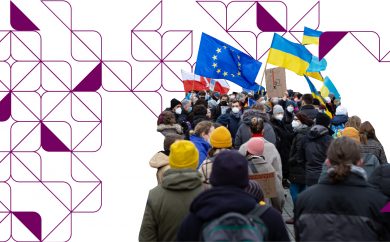The National Civic Engagement Poll is conducted under the framework of the Enhance Non-Governmental Actors and Grassroots Engagement activity (USAID/ENGAGE), implemented by Pact. This report summarizes key takeaways from the poll, drawing from survey data collected in the of summer 2019.
The survey gauges citizen awareness and engagement in civil society activities and citizens’ participation in and perception of reform processes in Ukraine. During the most recent survey, respondents were also asked questions that measure their level of civic literacy and citizens’ attitudes towards diversity.
The last data collection for the USAID/ENGAGE Civic Engagement Poll was conducted by the research agency Info Sapiens, during June-July 2019. Field interviews were conducted with Ukrainian residents aged 18 years and older, face-to-face, in the respondents’ homes. The survey sampled 2,054 respondents and was designed in accordance with the distribution of the adult population of Ukraine by age, sex, oblast and settlement type (excluding Crimea and non-governmental controlled regions of the Donetsk and Luhansk Oblasts). The margin of error of the sample is 2.2% (excluding the design effect).
The survey’s data and charts are available can be downloaded by registered website users.
Citizen engagement is low, but awareness of and interest in participation is a cause for optimism.
- One in four Ukrainians (25.2%) says that they regularly or rarely attend meetings in their communities. As in previous polls, a smaller share of citizens says that they are engaged in the activities of civil society organizations (17.1%).
- With respect to various forms of democratic participation, respondents were most engaged in the work of community committees (7.0%), public hearings (6.8%), peaceful assemblies (6.0%), reporting on infrastructural issues (5.9%), and submitting a formal complaint to authorities (5.1%).
- Four out of ten Ukrainians (8%) are aware of the ability to report infrastructural issues to authorities by phone, 37.4% are aware of the option of participating in peaceful assemblies, and 36.3% are aware of work in community committees. Citizens are least aware of types of activism that require some expertise, such as commenting on draft laws (24.9%) and participating in a formal advisory body (22.3%).
- Ukrainians were most interested in reporting infrastructural issues, either in-person or by phone (21.2%). Additionally, they showed interest in community work committees (19.8%), reporting infrastructural issues online (19.7%), and submitting formal complaints to authorities (17.8%).
- Citizens participate the least in anti-corruption activities. Only 1.9% reported corruption to officials, and the same share has been involved in reporting corruption publicly to the media. Only 1.7% have used online tools to anonymously report corruption or electoral violations.
Civic literacy is growing but citizens are not fully knowledgeable about their right to free assembly.
- While only 12.6% of Ukrainians correctly answered 10 out of 13 questions on civic literacy, this share has increased since June 2018, when it constituted 11.2%.
- Not a single respondent has been able to answer all 13 civic literacy knowledge questions correctly.
- The most difficult question for respondents concerned their ability to hold a peaceful assembly. Almost two thirds (59%) of citizens think they would need permission to hold a rally, while 20.9% did not answer at all. Additionally, respondents struggled with questions on local bodies of executive power (69.9% answered incorrectly, 7.6% did not answer), the definition of Ukrainian people in the Constitution (61.9% answered incorrectly, 6.8% did not answer), and the rate of income tax (34.6% and 32.7% respectively).
The National Exit Poll is the most recognized civil society initiative for the first time.
- For the first time, the National Exit Poll was the most recognizable civil society initiative—35.7% of Ukrainians recognized its logo. Exit Poll’s brand has surpassed two of the most well-known, large charity organizations.
- Other civic organizations with recognizable logos include the Victor Pinchuk Foundation (30.6%), Rinat Akhmetov Foundation (30.5%), Femen (26.6%) and Chesno (15.1%).
Almost half of citizens are ready to donate to a civil society organization.
- Four out of ten Ukrainians (44.4%) are ready to contribute to a cause they believe in and to a civil society organization they trust. Household income levels are correlated with readiness to support social causes, but not as much as one might expect. Even among those who do not have enough subsistence income, 39.4% are ready to contribute some funds to initiatives. The level of education is the strongest factor influencing the willingness to fund civic initiatives: the higher the education, the greater the likelihood to support civic initiatives.
- Among the reasons that motivate citizens to contribute to a civil society organization, respondents continue to be influenced by clear objectives or goals and the results of a civic initiative (38.4%). The second most influential factor is citizens’ trust in a civil society organization, important for 31.9% of respondents. Transparent management of funding is considered to be a significant factor as well, according to 29.7% of Ukrainians.
- Most people oppose laws that would require the government to direct taxpayer funds to civil society organizations’ activities (40%). Every third respondent, however, (34.2%) would be ready to support such a law.
Ukrainians are becoming impatient in expecting reforms to take root.
- More than a third (34.4%) of Ukrainians say that they have not experienced any consequences of reforms. Meanwhile, 27.9% have experienced both negative and positive consequences of reforms. A negative experience was common— approximately one in four respondents (26.7%) have had a negative experience with reforms while only 4.5% were lucky to have a positive experience.
- Ukrainians expect reforms to take more immediate effect. The majority (39.7%) of citizens expect consequences of reforms to occur within three years, while about one in every five citizens (19.5%) expect the impact of reforms to occur within five years. About the same proportion of the population (19.1%) believe that reforms will produce results in five years or more. This is an expectation that drastically changed within just one year: a year ago, one-third of respondents would expect the consequences of reforms to take more than five years while only one-fifth anticipated reform results within three years.
One in three Ukrainians has a negative attitude towards diversity and citizens are divided over their readiness to support discriminated groups.
- Every third Ukrainian (32.5%) believes that increasing diversity makes Ukraine a worse place to live. Only 9.5% believe that increasing the number of people from different ethnicities, social groups and sexual identities makes Ukraine a better place. The majority (58.0%) believes that it makes no difference.
- Among those groups Ukrainians view to be the most discriminated against, the relative majority named sexual minorities (25.3%). Apart from them, Ukrainians have also named internally displaced persons (18.4%), national minorities (16.9%), women (13.7%), and Muslims (9.3%).
- About 38% of Ukrainians is ready to support discriminated groups in defending their rights. The same amount reject the idea of standing up for others’ rights.
The environment is perceived to be a local-level problem rather than a countrywide problem.
- Citizens consider Ukraine’s main national problems to be fighting corruption (55.0%), the crisis in the Donbas (48.5%), and healthcare (41.1%).
- However, when asked about a problem that is personally important to them, Ukrainians said they were primarily concerned with healthcare (56.7%). Other personally-important issues included corruption (36.5%) and pension (28.9%).
- While environment ranked only fifth among eleven countrywide problems, it is perceived to be the number one local problem. A total of 53.8% are convinced that their locale is suffering from poor environmental issues, the largest share among the proposed possible local problems. Apart from that, Ukrainians are concerned at the local-level with economic decline (49.5%), emigration (32.0%), healthcare (26.6%), and education (17.2%).
The new President is trusted in the fight against corruption.
- More than a quarter of citizens (28.7%) are certain that the new President is willing to fight corruption. While it is not a seemingly large percentage, it is the largest amount observable among state authorities and a significant leap compared to the 4.2% of Ukrainians who believed the previous President wanted to fight corruption (when polled in Summer 2018).
- Apart from the President, Ukrainians trust the National Anti-Corruption Bureau in its efforts to fight corruption (20.8%), followed by the National Agency on Corruption Prevention (17.4%), the General Prosecutor’s Office (12.2%), and local self-government (10.6%).
- As for the responsibility of fighting corruption, there is a clear tendency of placing larger responsibility on non-governmental agents and reducing the role of authorities. Since September 2017, those who believe that the media are responsible in fighting corruption has grown from 8.9% to 20.3%, while those believing civil society organizations are responsible has increased from 3.8% to 11.8%. The responsibility of ordinary citizens has grown within the margin of error from 25.4% to 29.1%, although the citizens themselves are the least active in anti-corruption activities (see section one). On the other hand, each and every government body from the proposed list is perceived to have played a smaller role in fighting corruption than they were in September 2017.
This survey summary was prepared by Pact as part of the USAID/ENGAGE activity, which is funded by the United States Agency for International Development (USAID). The contents of this survey summary are the sole responsibility of Pact and its implementing partners and do not necessarily reflect the views of USAID or the United States Government.


